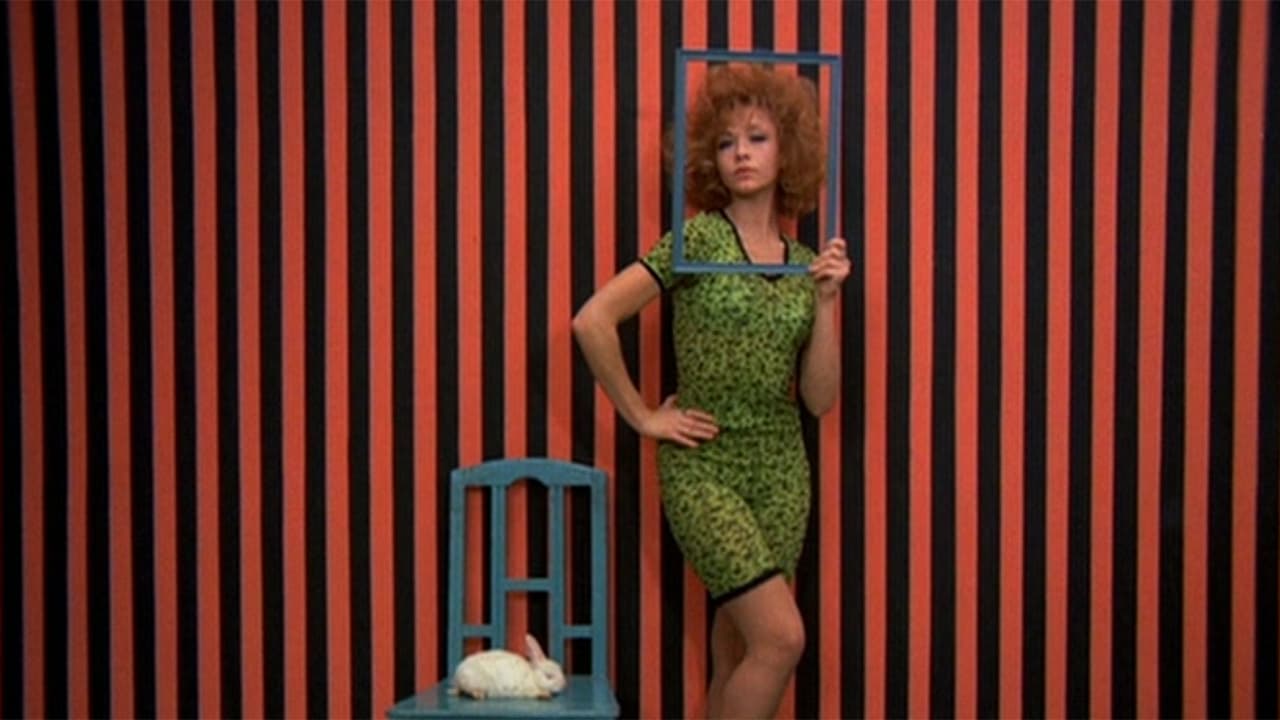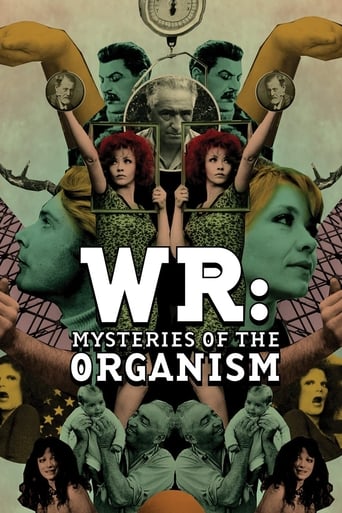

Directed by Serbian filmmaker Dusan Makavejev (also known for directing 'Sweet Movie', and the Australian produced 'The Coca-cola Kid'), the film mixes documentary and narrative cinema, to comment on the infiltration of Soviet Communism, sexual politics/sexual revolution, in a political satire. The main drive of the film to begin with is the work of Austrian-American psychiatrist and psychoanalyst, Dr Wilhelm Reich: His theories of Organon therapy (use of static electricity), and the connection between neuroses in people that is rooted in physical, sexual and social surroundings. This connects also with the work of Alexander Lowen, an American psychotherapist (and student of Reich's), who practices and teaches Bioenergetic analysis which uses therapeutic body work to associate the mind with the body, and in theory release repressed energy through the body sexually without the act of physical sex. I observed in these sequences a kind of connection to the work of Arthur Janov, and his primal scream therapy.The narrative section of the film tells the story of Milena (Milena Dravic) and her sexually promiscuous flatmate Jagoda (Jagoda Kaloper), and their theories and speeches of sexual revolution: "The October revolution was ruined when socialism rejected free love". They meet a Russian communist figure skater, Ivica (Vladimir Ilivich), who they seduce. But Milena soon discovers that communism has no time for sexuality unless it is first met with physical violence. This seems to be a metaphor for the struggle against Stalinist communism within Yugoslavia since the second world war. But in the film Ivica seems somewhat deluded by the concept of communism (as he states, "communism is a Latin word meaning communal), whilst almost being made rigid by the sexual intentions of Milena.The most interesting part of the film is the first part that focuses on the life and work of Wilhem Reich (hence the W. R. in the films title). He first started working in psychoanalysis with Sigmund Freud in the 1920's, but after writing books such as 'The Mass Psychology of Fascism', fled Austria for America, where he settled in Maine. He worked on his theories of orgone therapy, and developed the orgone accumulator, an organic box lined with lead that individuals would sit in and is theorised as giving both therapy to the bodies organs and to sexuality (The use of the orgone accumulator was even endorsed by William S. Burroughs.). Eventually Reich was arrested (more than likely the victim of situation - i.e. he was from behind the iron curtain), and viewed as insane - despite being tried in court. All of his books were burned in New York, supervised by the federal food and drugs administration agents (take from that what you will).It is an interesting film. The different strands are connected by the theories of Wilhelm Reich. But it's one of those films that is probably more interesting to talk about than watch as it is incredibly slow moving, and at times seems to focus on activities (such as bioenergetic analysis), as group fad, and seems to almost fall into a 'new age' enlightenment message. Released in 1971, this would make sense, as the sexual revolution was in full 'swing'. Despite all of this it is a relatively enjoyable piece of cinema, with some nice ideas in it. But again, the life of W R far outshines the film as a whole.www.the-wrath-of-blog.blogspot.com
... View MoreWR is not exactly a full-blown "perfect film". It is, without a doubt, one of the most in-your-face forms of personal, artistic and political expression put out in the period. Only Godard can be compared for something as demanding and daring as W.R., but even then there could be compromises due to his penchant for drawing out the facet of the cinematic essay. Writer/director Dusan Makavejev goes fearlessly into making a hybrid of documentary and fiction, where one sees a truly raw form take place in how he places his camera on subjects and on locales, and an attitude of recklessness in how he edits together the fictional segments (a free-love inspired communist Yugoslavian meets a more uptight male ice skater and fall somewhat in a kind of love surrounded by semantics) with archival footage and the documentary. It's this same reckless quality and adherence only to throw out any typical narrative that makes W.R such a crazy milestone in the avant-garde (which, by the way, Makavejev says is only relative to other films). He could have just made a serious work about the writer/sex therapist Wilhelm Reich, or a romantic drama about two differing sides of the personifications of communist ideas played out, but he's discontent with making either or and does both, and more. It's a film of its time, but not trapped in it.One of the best things that also comes out right away from W.R. is that it is, in the tradition of another cinematic anarchist like Godard, a full-blown satire. This is essential because without this spirit of mocking and criticizing the very things that Makavejev is praising (i.e. Leninist and Stalinist propaganda footage is inter-cut with footage from what must be committed folk at an asylum getting electroshock and knocking heads against the wall), the film would very quickly become preachy and didactic, and might have actually been more-so accepted by the Yugoslav censors. It's the very act of humor about it all, of having sex as if in a kaleidoscope put to dry narration, or the crazy bearded guy with a helmet carrying around a gun and sometimes giving it a 'good time, or how some weird drunken neighbor literally crashes through the wall of the communist girl's apartment while he and the ice skater talk politics and her (very naked) friend does leg exercises, that makes it on the surface seem so outrageous.And believe-you-me, it didn't get the "Luis Bunuel award" at Cannes for nothing! Going between a gay guy telling about his prime sexual experiences to seeing women and men in the throws of Reich's 'method' of releasing pent up tensions (this may be the only repetitive portion of the film, not s shocking to anyone who's seen any given episode of HBO's Real Sex, albeit for the period it's quite absorbing), and then back to Reich's theories that were crushed and burned as he died in a prison, and then back again to the Yugoslav 'love' story that ends with a few image that Jodorowsky might wince at.And as this is all going on, Makavejev doesn't let the audience stop thinking, either. Behind a sequence like when Milena riles up the men in the building complex to have a free and healthy attitude towards communism is some truth, contained within what is obviously a parody of communist propaganda films are points that the viewer has to take into account, or at least to fill in some blanks as the film goes forward.The lack of structure then, in a sense, is structured as such, and it becomes an act of participation to guess what might come next, of what might be either informative- like the history of Reich as writer and controversial figure, almost by bad luck, or about the delirious technique of the 'box' used by Reich on his patients- or entertaining, in ways that only a provocateur can handle. Now, take this as a fact, know what you're getting into before you seek out the Criterion DVD. It's quite a graphic film in terms of showing full on sex, aroused genitalia, and sometimes not in always the playful manner intended. But it's not simply that to look out for, though even by today's standards it's a bit surprising. What makes W.R. such a unique and warped bird of art is how it challenges the viewer, provokes fully if not discussion then some kind of collision of intellectual and visceral reaction for those who at least meet the filmmaker halfway. Once in a while frustrating, but never ever boring, W.R. is a cinematic shock from a go-for-broke iconoclast.
... View MoreThis takes the form of seemingly everything from 1965 to 1975. It's a hippy-dippy, uncritical, anti-establishment goof on the work of Wilhelm Reich, with agit-prop sub-plot for good measure. 'What's New Pussycat?' meets 'Theremin.'Wilhelm Reich's tenuously connected work and pseudo-scientific gadgets (WTF does the accumulator do? How do orgasms change cloudscapes?) are more like something a flakey "inventor" would make than a serious analyst. Just because a previously intelligent person suddenly declares a correspondence between any two things (war and chocolate cake, or... orgasms and Marxist Utopia) doesn't make it so. Just because a quack found some drama queens to indulge him doesn't mean the work was valid. His ideas are as odd and harmless as his punishment was draconian overkill. Another testament to the usual misuse of government to keep Joe Average feeling unthreatened, regardless of how oversensitive Joe's threat mechanism is. Reich (to me) had firmly lost the path of knowledge, but he didn't seem to be harming anyone. No one involved (Reich, his patients, the authorities) apparently knew much about moderation. Thank God that period is over and we've said goodbye to both Orgonon and the Police State.The movie is amateurishly edited together with a side-narrative; a frigid wretch intones about sexual freedom, but can't actually make her way to a sexual event (with an ice skater) to save her life. Much better to talk and talk and talk about the state and it's repression of the perfect workers collective via sexual shame. Good times! This movie left me thinking that rank-and-file demagoguery (the preference of the individual to address society than another person) and the national urge to ramble on ad nauseum about half-understood political ideas, would have to be defeated before the Soviet chokehold could successfully be removed from the population. This half offers a few laughs but it fails to build.It's not easy to watch due to weirdness and annoyance, but at least this movie engages provocative ideas, something most movies flee from. I left early, having got the (very repetitive) point.
... View MoreThis is too disjointed to be enjoyable - even if you know a bit about William Reich. One story is a fictional account about a Yugoslavian woman who falls in love with a Russian ice skater, and is at least well filmed and interesting, but you can easily get lost in the surrealism. The other "stories" are factual: interviews with people from Reich's hometown, Jackie Curtis talking about his first gay sexual encounters, the editor of Screw magazine getting his penis cast, Tuli Kupferberg prancing around with a machine gun, and the most interesting parts: various doctors talking about Reich's orgone therapies, and the effect of orgasms on various patients. Oh, and we get to see one of the few remaining orgone accumulator and we even get some short snippets of a cloudburster - unfortunately that is not explained to the audience so you either know it's a cloudburster or you don't. Three things inherently wrong with this film - the attempts to be clever with the juxtapositioning renders the film quite incomprehensible; the white subtitles over an often white background means much of the footage cannot be understood (unless you speak Russian or Serbian) and, quite importantly, one image is so graphically disturbing that I will have difficulty dealing with it: we see a poor prisoner being given electroshock treatment by the Nazis. It's horrible, absolutely horrible, and whilst it's important that we know of the atrocities that happened in WWII and before, I would rather have been mentally ready for it. The scene is thrust on you suddenly, and it is extremely disturbing. Beware before watching this film, and decide whether you are really ready for a completely incomprehensible mind***k... with some nasty nightmarish scenes thrown in for luck. This is certainly not family viewing. You have been warned.
... View More